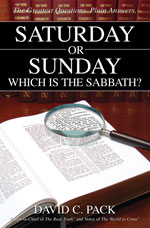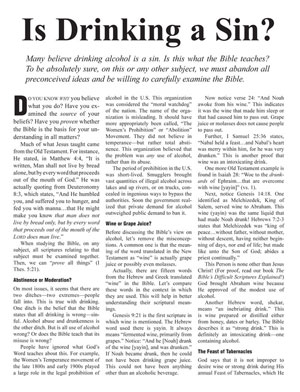Do you know why you believe what you do? Have you examined the source of your beliefs? Have you proven whether the Bible is the basis for your understanding in all matters?
Much of what Jesus taught came from the Old Testament. For instance, He stated, in Matthew 4:4, “It is written, Man shall not live by bread alone, but by every word that proceeds out of the mouth of God.” He was actually quoting from Deuteronomy 8:3, which states, “And He humbled you, and suffered you to hunger, and fed you with manna…that He might make you know that man does not live by bread only, but by every word that proceeds out of the mouth of the Lord does man live.”
When studying the Bible, on any subject, all scriptures relating to that subject must be examined together. Then, we can “prove all things” (I Thes. 5:21).
Abstinence or Moderation?
On most issues, it seems that there are two ditches—two extremes—people fall into. This is true with drinking. One ditch is the belief that the Bible states that all drinking is wrong—sinful. Alcohol abuse and drunkenness is the other ditch. But is all use of alcohol wrong? Or does the Bible teach that its misuse is wrong?
People have ignored what God’s Word teaches about this. For example, the Women’s Temperance movement of the late 1800s and early 1900s played a large role in the legal prohibition of alcohol in the U.S. This organization was considered the “moral watchdog” of the nation. The name of the organization is misleading. It should have more appropriately been called, “The Women’s Prohibition” or “Abolition” Movement. They did not believe in temperance—but rather total abstinence. This organization believed that the problem was any use of alcohol, rather than its abuse.
The period of prohibition in the U.S. was short-lived. Smugglers brought vast quantities of illegal alcohol across lakes and up rivers, or on trucks, concealed in ingenious ways to bypass the authorities. Soon the government realized that private demand for alcohol outweighed public demand to ban it.
Wine or Grape Juice?
Before discussing the Bible’s view on alcohol, let’s remove the misconceptions. A common one is that the meaning of the word translated in the New Testament as “wine” is actually grape juice or possibly even molasses.
Actually, there are fifteen words from the Hebrew and Greek translated “wine” in the Bible. Let’s compare these words in the context in which they are used. This will help in better understanding their scriptural meanings.
Genesis 9:21 is the first scripture in which wine is mentioned. The Hebrew word used there is yayin. It always means “fermented wine, primarily from grapes.” Notice: “And he [Noah] drank of the wine [yayin], and was drunken.” If Noah became drunk, then he could not have been drinking grape juice. This could not have been anything other than an alcoholic beverage.
Now notice verse 24: “And Noah awoke from his wine.” This indicates it was the wine that made him sleep or that had caused him to pass out. Grape juice or molasses does not cause people to pass out.
Further, I Samuel 25:36 states, “Nabal held a feast…and Nabal’s heart was merry within him, for he was very drunken.” This is another proof that wine was an intoxicating drink.
One more Old Testament example is found in Isaiah 28: “Woe to the drunkards of Ephraim…that are overcome with wine [yayin]” (vs. 1).
Next, notice Genesis 14:18. One identified as Melchizedek, King of Salem, served wine to Abraham. This wine (yayin) was the same liquid that had made Noah drunk! Hebrews 7:2-3 states that Melchizedek was “king of peace…without father, without mother, without descent, having neither beginning of days, nor end of life; but made like unto the Son of God; abides a priest continually.”
This Person is none other than Jesus Christ! (For proof, read our book The Bible’s Difficult Scriptures Explained!) God brought Abraham wine because He approved of the modest use of alcohol.
Another Hebrew word, shekar, means “an inebriating drink.” This is wine prepared or distilled either from honey, dates or barley. The Bible describes it as “strong drink.” This is definitely an intoxicating drink—one containing alcohol.
The Feast of Tabernacles
God says that it is not improper to desire wine or strong drink during His annual Feast of Tabernacles, which He commands His people to keep: “And you shall bestow that money for whatsoever your soul lusts after [desires], for oxen, or for sheep, or for wine, or for strong drink, or for whatsoever your soul desires: and you shall eat there before the Lord your God, and you shall rejoice, you, and your household” (Deut. 14:26).
The Feast of Tabernacles (occurring in the fall) is one of seven annual Holy Days, or feasts, which God commands His people to observe. The true Church of God keeps them. (Read our book God’s Holy Days or Pagan Holidays?)
Wine can also be used to help you relax and rejoice. King Solomon wrote, “A feast is made for laughter, and wine makes merry” (Ecc. 10:19). There are several places in the Bible where God emphasizes the importance of having a merry heart and enjoying hearty laughter. Modest amounts of wine or other kinds of alcohol can help promote this.
Many additional scriptures could be cited to show God’s servants using wine in a responsible way, and with God’s approval.
New Testament Word for Wine
The New Testament word translated “wine” is usually the Greek word oinos. The story of the Good Samaritan shows that wine (fermented alcohol) can be used as an antiseptic to treat wounds. A small amount of oil (usually olive oil) would be poured on the wound to soften it, and then a little wine used to cleanse it (Luke 10:30-37). Today, rubbing alcohol is still commonly used as an antiseptic.
Water Into Wine
Jesus’ first recorded miracle was changing water into wine. Take note that His miracle was not the other way around! He did not change wine into water. Not only did Christ approve of drinking wine, but His miracle was actually for the purpose of providing alcohol for everyone in attendance! The “governor” at the wedding even commented that it was “good wine” (John 2:1-12).
If this had merely been grape juice, he would not have said, “but You have kept the good wine until now.” The point is that better wine would normally be consumed at the start of a feast, and the inferior quality should be saved for later, when the taste is not quite as important. This principle certainly does not apply to grape juice.
Paul’s Instruction to Timothy
I Timothy 5:23 contains a remarkable statement in the form of instruction from the apostle Paul to Timothy. He wrote, “Drink no longer water, but use a little wine for thy stomach’s sake and thine often infirmities.” Wine has inherent properties, which are beneficial for the human body.
Consider the following quote: “‘Numerous well designed studies have concluded that moderate drinking is associated with improved cardiovascular health,’ wrote the director of the National Institute on Alcohol Abuse and Alcoholism (NIAAA) in 1966. The Nutrition Committee of the American Heart Association also reported in 1966, ‘The lowest mortality occurs in those who consume one or two drinks per day.’”
Though these statements were written in 1966, they have stood the test of time and are just as relevant today. Red wine has been proven to contain elements that lower cholesterol and fight cancer.
Understanding its value when used in moderation, certain cultures even permit the modest use of alcohol by minors, under close adult supervision, resulting in measurable health benefits.
A Warning from Proverbs
There are some scriptures, which, if not read carefully, do seem to condemn the use of wine. We will see that they do not condemn its right use but rather its wrong use. Nowhere in the Bible does God condemn the use of wine, as long as it is not abused. In fact, as stated above, He encourages the modest use of wine and other strong drink during the Feast of Tabernacles. The moment that over-drinking begins is the moment that sin begins.
Let’s now consider Proverbs 23:29-35 (NKJV): “Who has woe? Who has sorrow? Who has contentions? Who has complaints? Who has wounds without cause? Who has redness of eyes? Those who linger long at the wine, those who go in search of mixed wine. Do not look on the wine when it is red, when it sparkles in the cup, when it swirls around smoothly; at the last it bites like a serpent, and stings like a viper. Your eyes will see strange things, and your heart will utter perverse things. Yes, you will be like one who lies down in the midst of the sea, or like one who lies at the top of the mast, saying: they have struck me, but I was not hurt; they have beaten me, but I did not feel it. When shall I awake, that I may seek another drink?”
This is a description of someone who has consumed way too much alcohol. A drunken man is belligerent, combative, seemingly always ready for a fight—and always complaining about this or that injustice because his senses are in a stupor. Those in this condition commonly seem to imagine themselves as having been wronged. Overuse of alcohol blurs judgment and perception.
This verse paints the familiar picture of a drunk stumbling and falling, and perhaps bruising himself, without knowing it at the time. His “bloodshot” eyes (redness) come from excessive drinking. Later, such a person may sober up and wonder where and how he had acquired his injuries. Yet, he may already be looking for his next drink.
Yes, one who is a winebibber or an alcoholic is in sad shape. He cannot function properly, is often anti-social, and, in the end, is usually concerned only for himself. He disregards the needs of others.
Does any part of this picture resemble you? Could this be a picture of your weekends—or even a typical weeknight out? Are you one who goes to the local tavern or bar for “just one” and does not know when to quit? Drunkenness and alcoholism are clear violations of God’s Law.
Galatians 5:21 contains a warning about conduct that will keep people out of the coming kingdom of God. It states that, “Envyings, murders, drunkenness, revellings, and such like: of the which I tell you before, as I have also told you in time past, that they which do such things shall not inherit the kingdom of God.”
In a similar instruction to the Corinthians, Paul wrote that no thieves, idolators, adulterers, extortioners or drunkards, etc., “shall inherit the kingdom of God” (I Cor. 6:9-10).
God has standards—and they are described in His Word. This includes the right and wrong use of alcohol. God prescribes neither abstinence nor overuse of alcoholic beverages.
What Does God Expect?
Is the drinking of wine and other alcohol sinful pleasure, or a healthful life-improving habit? We saw that Christ approved of drinking wine. His actions and words set the example by which Christians are to live.
What does God expect of you? He expects you to use alcohol wisely. Jesus has not changed. Hebrews 13:8 states that He is “the same yesterday, and to day, and for ever.” We are to “follow His steps” (I Pet. 2:21-24). This principle is clear. Drinking alcoholic beverages is not wrong or sinful! The misuse of alcoholic beverages is sinful! It is not the bottle that is the problem—it is the person holding the bottle!
As with food, money, or anything that has the potential for misuse, moderation is the Bible standard for all true Christians. Paul wrote, “Everyone that strives for the mastery is temperate in all things” (I Cor. 9:25) and “Let your moderation be known unto all men” (Phil. 4:5).



















